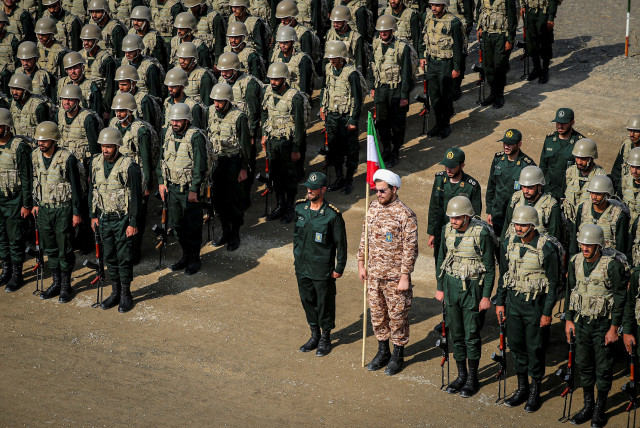Iran’s Zarif slammed as defeatist, traitor for Instagram statement - analysis

Zarif who helped negotiate the 2015 Iran nuclear deal was replaced by the new 2021 government.
Several years ago, then-foreign minister of Iran Javad Zarif was riding high, often using his Twitter account to mock Israel and the Trump administration, insinuating that the US was seeking to go war with Iran for Israel. Now Zarif finds himself in hot water, having been slammed for an Instagram post in which he discussed “compromise,” one of the first major statements from the former official in a while.
Zarif has been slammed by pro-regime media such as Tasnim and Fars News, with one of them claiming he is not a good diplomat, even in defending his own decisions.
Zarif’s long Instagram comment was picked up by some foreign media, including Radio Farda. On Saturday, Zarif wrote on his Instagram page: “Having a dream gives direction to life, but paying attention to abilities makes it possible to move toward ideals.”
As of Sunday, his Instagram post received 38,000 likes. The post discusses Iran’s long history and the gap between goals and possibilities, insinuated to be a way of discussing Iran’s current government without being openly critical.
“Throughout history, we have set our goals based on our desires and ignored our abilities,” he added, noting that, in the past those who dared to go against “wishful movements” were called “compromisers” and “traitors.” In essence, he is accusing the government of bashing people like him as “traitors” and not being realistic.
He also refers to historic Iranian territorial compromises and losses in the treaty of Gulistan in 1813 and the Treaty of Turkmenchay in 1828, in which Qajar Iran lost territory to what was then the Russian Empire. Zarif argues that it is important to pursue dreams in the framework of possibilities.
This appears to be a reference to how stubborn the Iranian regime is in relation to returning to a deal with the US. Recent reports indicate Iran and the US may be having discussions with Oman as mediator. The US has also been apparently doing outreach to Beijing, a key partner of Iran, which brokered a deal between Iran and Saudi Arabia.
The tables turn
Where once Zarif boasted that he was close to the IRGC, today pro-IRGC media, such as Fars News and Tasnim, are running articles calling this a “sad note” for him. Fars News has said that “it is a pity for a nation that has experienced the conquest of Khorramshahr, to narrate the history wrongly,” a reference to the Iran-Iraq war when Iran prevailed over Iraq in a battle in Khorramshahr.
There, Iraq possessed masses of Soviet weapons and poison gas, and yet was able to push the Iraqis back. The articles bashing Zarif are basically accusing him of being a defeatist and appeaser, arguing that he sought to explain or excuse failures of the former Persian Empire in the 19th century. Tasnim News slammed Zarif as well.
Zarif’s star has been fading for a while. While he used to be the toast of the town internationally, he has lost his luster, because he no longer is Iran’s chief explainer and face to the world. Zarif had a method of protocol in the West, where he tried to appear liberal and make Iran seem normal; whereas in the East he generally toed the authoritarian line.
This Janus-face worked well for a while, when the West desperately wanted the Iran nuclear deal in 2015. The Iranian Foreign Ministry under Zarif was very good at cultivating friends in the West, creating a kind of pro-Iran regime lobby, feeding off antisemitism and anti-Israel views by making it seem like US-Iran tensions could result in “war” and that critics of Iran were motivated by Israel and therefore Israel was pushing the US to war with Iran.
But this talking point hasn’t worked for years, and Iran has openly begun attacking US troops in Iraq and Syria and harassing ships and sending drones to Russia for use against Ukrainian civilians.
So Zarif feels the Iranian government squandered the good will it had in the West and that it hasn’t successfully been able to play the anti-Israel card. However, by commenting on sensitive historical issues relating to Iran, he appears to have struck a nerve among some nationalists and the IRGC.
Jerusalem Post Store
`; document.getElementById("linkPremium").innerHTML = cont; var divWithLink = document.getElementById("premium-link"); if (divWithLink !== null && divWithLink !== 'undefined') { divWithLink.style.border = "solid 1px #cb0f3e"; divWithLink.style.textAlign = "center"; divWithLink.style.marginBottom = "15px"; divWithLink.style.marginTop = "15px"; divWithLink.style.width = "100%"; divWithLink.style.backgroundColor = "#122952"; divWithLink.style.color = "#ffffff"; divWithLink.style.lineHeight = "1.5"; } } (function (v, i) { });

